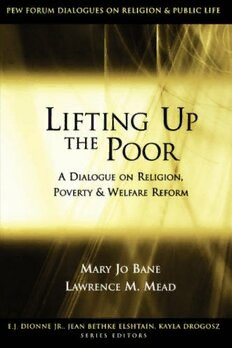
Lifting Up the Poor: A Dialogue on Religion, Poverty & Welfare Reform (The Pew Forum Dialogues on Religion and Public Life) PDF
192 Pages·2003·0.674 MB·English
Most books are stored in the elastic cloud where traffic is expensive. For this reason, we have a limit on daily download.
Preview Lifting Up the Poor: A Dialogue on Religion, Poverty & Welfare Reform (The Pew Forum Dialogues on Religion and Public Life)
Description:
People who participate in debates about poverty - and its causes and cures - often speak from religious conviction. But those underlying commitments brought to bear on specific policy choices. Two scholars and policy advocates bring their faith traditions, policy experience, academic expertise and political commitments together in this informed discussion of a vexing public issue. Mary Jo Bane writes of her experiences running social service agencies, work that has been informed by "Catholic social teaching and the catholic sensibility that is shaped every day by prayer and worship". Drawing from the various Christian traditions, Lawrence Mead's essay discusses the role of nurturing Christian virtues and personal responsibility as a means of combating poverty. Quoting Shelley, Mead describes theologians as the "unacknowledged leglisators of mankind". Bane emphasizes the social justice claims of her tradition,and Mead draws from virtue theory. But both assert that an engagement with religious tradition is indispensable to an honest and searching debate about poverty.
See more
The list of books you might like
Most books are stored in the elastic cloud where traffic is expensive. For this reason, we have a limit on daily download.
